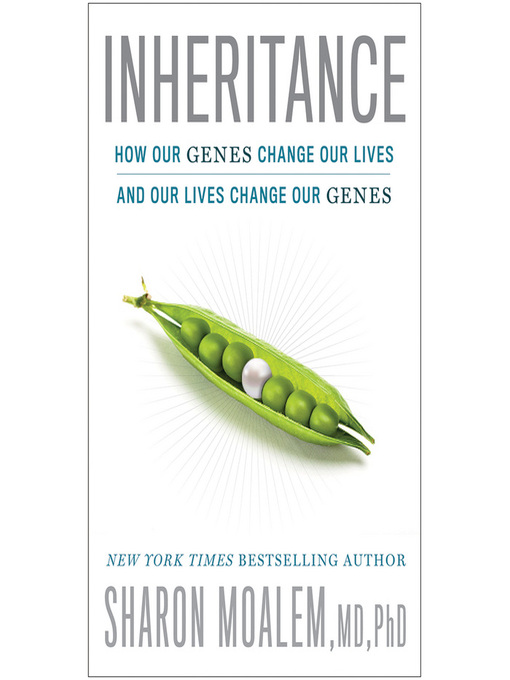
Inheritance
How Our Genes Change Our Lives—and Our Lives Change Our Genes
چگونه جنسیت ما زندگی ما و زندگی ما را تغییر میدهد، جنسیت ما را تغییر میدهد
کتاب های مرتبط
- اطلاعات
- نقد و بررسی
- دیدگاه کاربران
نقد و بررسی

February 24, 2014
Geneticist and bestselling author Moalem (How Sex Works) aims to promote awareness about genes and how they function in this enjoyable read. Writing primarily in a casual tone, Moalem demonstrates an unerring instinct for picking eye-catching discoveries in gene research to write about—this instinct is both a blessing and a curse. The excitement of his prose is palpable: “From striking a ball with a tennis racket, to pinching the cheeks of a loved one, to the bouncing here, there, and everywhere joy of gummy bears, that elastic ‘snap back into shape’ action you’re feeling is all thanks to collagen.” But while the writing is never over-burdened with scientific jargon, it often lacks cautionary notes and vital information that helps to put new research in its proper context. For example, he discusses a study that found striking epigenetic changes in a bullied twin that were not apparent in the twin sibling who wasn’t bullied. Moalem overstates the significance of this finding, claiming “in no uncertain terms” what the rather small study itself says merely “supports a hypothesis,” which may mislead readers. Otherwise, however, Moalem’s book is a page-turner and will surely inspire people to get better educated about genes and genetics.

April 1, 2014
A compendium of facts and case studies on genes. Moalem (How Sex Works: Why We Look, Smell, Taste, Feel, and Act the Way We Do, 2009, etc.) examines two main ideas: 1) that your genes are not your destiny--environment and behavior can tune genes up or down or turn other genes on or off in the process of "epigenetic" control; 2) that nobody is "average." We are all unique in our DNA and how our lives interact with that endowment, so beware of "average daily requirements" and other recommendations. Moalem illustrates these tenets with intriguing stories--e.g., a chef who switched from his meat-heavy, high-fat diet to emphasize fruits and vegetables only to discover that he felt lousy due to the fact that he suffered from hereditary fructose intolerance. Sadly the author relates the story of a little girl given codeine for pain following a tonsillectomy. She had an extra gene coding for the enzyme metabolizing the drug, which resulted in rapid production of excess morphine, which killed her. Moalem describes studies of stress in infant mice (leading them to "give up" when faced with adverse conditions as adults), dietary influences on bee larvae (those given royal jelly become queens; the others, workers) and bullying (one study shows blunted cortisol responses in adulthood). Moalem argues for the usefulness of knowing your genome but is also concerned that the information could be hacked and used against you. He recommends getting detailed medical histories from relatives and explains how even examining your face can be informative about your genetic history. The author covers a wide range of subjects: rare diseases, what's bad about vitamins and supplements, drugs used in athletic doping, his case of altitude sickness and more. Readers may occasionally seek less of Moalem's enthusiasm and ego, but he has a lot of solid information to convey and a stylish way of telling it.
COPYRIGHT(2014) Kirkus Reviews, ALL RIGHTS RESERVED.

April 1, 2014
In the biological tug-of-war between nature and nurture that determines exactly who you are, there is no clear-cut winner. To explain why, physician-scientist Moalem invokes two important concepts, flexible inheritance and epigenetics. Flexible inheritance is defined as the relationship between what our genes do to us and what we do to our genes. Turns out that genetic traits can change. Genes are surprisingly sensitive. How we live influences our DNA. Moalem likens genes to thousands upon thousands of little light switches, some are turning on while others are turning off. An example of epigenetics is how a chemical (betaine) contained in spinach can ward off genetic mutations that give rise to cancer. Many rare hereditary metabolic disorders are discussed in the book. The ways that doctors utilize the study of genetics in their medical practices are described. Human beings are more than the product of a genetic blueprint. As Moalem writes, We are the genetic culmination of our life experiences, as well as every event our parents and ancestors ever lived through and survived. (Reprinted with permission of Booklist, copyright 2014, American Library Association.)

November 1, 2013
Given my genes, I'm pretty much stuck with my shy but combustible temperament, right? Actually not, says best-selling award winner Moalem; the human genome ismore bendable than previously envisioned. With a 75,000-copy first printing.
Copyright 2013 Library Journal, LLC Used with permission.

























دیدگاه کاربران